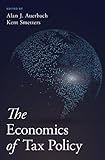Economics of tax policy
Material type: TextPublication details: New York Oxford University Press 2017ISBN:
TextPublication details: New York Oxford University Press 2017ISBN: - 9780190619725
- HJ2305 .E263 2017
- BUS064000 | BUS051000 | LAW086000
 Print
Print
| Item type | Home library | Collection | Call number | Status | Date due | Barcode | |
|---|---|---|---|---|---|---|---|
 Print
Print
|
OPJGU Sonepat- Campus Main Library | General Books | 336.2 EC- (Browse shelf(Opens below)) | Available | 138920 |
Browsing OPJGU Sonepat- Campus shelves, Collection: General Books Close shelf browser (Hides shelf browser)

|
No cover image available |

|

|

|

|

|
||
| 336.091724 TR-P Public sector economics | 336.0954 SR-I Issues in Indian public finance | 336.16 SP-R Regulation of franchising in the new global economy | 336.2 EC- Economics of tax policy | 336.2 FR-T Theory, principles and management of taxation an introduction | 336.2 FR-T Theory, principles and management of taxation an introduction | 336.2 IN- International tax coordination an interdisciplinary perspective on virtues and pitfalls |
" The debates about the what, who, and how of tax policy are at the core of politics, policy, and economics. The Economics of Tax Policy provides a straightforward overview of recent research in the economics of taxation. Tax policies generate considerable debate among the public, policymakers, and scholars. These disputes have grown more heated in the United States as the incomes of the wealthiest 1 percent and the rest of the population continue to diverge. This important volume enhances understanding of the implications of taxation on behavior and social outcomes by having leading scholars evaluate key topics in tax policy. These include how changes to the individual income tax affect long-term economic growth; the challenges of tax administration, compliance, and enforcement; and environmental taxation and its effects on tax revenue, pollution emissions, economic efficiency, and income distribution. Also explored are tax expenditures, which are subsidy programs in the form of tax deductions, exclusions, credits, or favorable rates; how college attendance is influenced by tax credits and deductions for tuition and fees, tax-advantaged college savings plans, and student loan interest deductions; and how tax policy toward low-income families takes a number of forms with different distributional effects. Among the most contentious issues explored are influences of capital gains and estate taxation on the long term concentration of wealth; the interaction of tax policy and retirement savings and how policy can "nudge" improved planning for retirement; and how the reform of corporate and business taxation is central to current tax policy debates in the United States. By providing overviews of recent advances in thinking about how taxes relate to behavior and social goals, The Economics of Tax Policy helps inform the debate. "--
"Debates about the optimal structure for tax policies and tax rates hardly cease among public, policy, or academic audiences. These have only grown more heated in the United States as the gap between incomes of the wealthiest 1 percent and the rest of the population continue to diverge. Tax research perhaps has not fully kept pace with the relentless demand of various interests to adjust tax policy. Nonetheless, specialists in the economics of tax policy in recent years have profited from advances in economic theory, econometric measurements, and data quality and access that are beginning to allow a greater consensus on what are the real effects of tax policy and how government levies affect individuals and businesses. The volume edited by Professors Auerbach and Smetters represents an attempt to reduce the lag between the conduct of research on tax issues and its transmission to a broader public. The contributions would explore highly topical issues such as the effects of income tax changes on economic growth, the potential effects of capping certain tax expenditures, the economics of adjusted business tax policy, and environmental tax options. Other essays would investigate perennially important themes such as the conduct of tax administration, the growing role of the tax system on education policy, tax policy toward low-income families, capital gains and estate taxation, and tax policy for retirement savings. A final paper would examine three different options for fundamental tax reform"--
There are no comments on this title.

